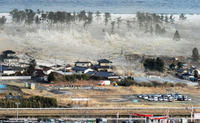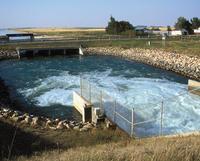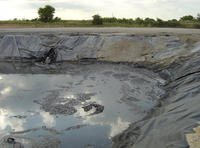-
Sensors detecting nuclear tests detect tsunamis, too

The Comprehensive Nuclear test-Ban Treaty (CTBT) is supported by arrays of sensors at sixty sites across the world that listen for the low boom of atmospheric blasts. They are tuned to infrasound — frequencies under 20 hertz (cycles per second), the lowest humans can hear; these sensors are meant to pick up illicit nuclear tests, but they can also pick up tsunami-producing tremors — and provide timely warning to those likely to be affected
-
-
NOAA scientists cleared of wrongdoing in email scandal
A recent investigation by the Commerce Department’s Inspector General has cleared the National Oceanic and Atmospheric Administration (NOAA) of any wrong doing in a recent scandal over an email exchange with British academics; in 2009 more than 1,000 emails between NOAA scientists and the Climatic Research Unit at the University of East Anglia in the United Kingdom were stolen; the emails suggested that scientists had manipulated results and thrown out faulty data; the recent report exonerates the scientists of any wrongdoing, and several British reviews have already cleared the name of British scientists
-
-
Vallon showcases innovative mine detector
German company Vallon unveiled its latest mine detection system; one of its advantages is that it can detect mines made with no metal parts (the device can detect metal-free particles at a depth of 40 cm, and metal objects at greater depths); the UN is already deploying the device in mine-clearance operations in thirty countries
-
-
Day of invisibility cloak nears
In physics, the Doppler Effect describes the change in frequency of light or sound waves whenever there is a relative movement between an observer and a wave’s source; thus, when an object and an observer move closer together, light frequency increases from red wavelengths to blue ones; when they move further apart, light frequency decreases from blue to red; researchers have for the first time ever demonstrated a reversal of the optical Doppler Effect — a promising sign for the future development of science fiction-inspired technology such as invisibility cloaks; this technology, which has already been demonstrated on a micro-scale by U.S. researchers, may be closer to becoming a reality than most people think
-
-
Mitigation policy could halve climate-related impacts on water scarcity
Even without the effects of climate change, as much as 40 percent of the world’s population will be living under water scarce conditions by 2020; climate change is expected to influence future water scarcity through regional changes in precipitation and evaporation; most climate models suggest rainfall is likely to decrease in the subtropics and increase in mid-latitudes and some parts of the tropics; in the latter, mitigation efforts could actually reduce the amount of extra water potentially available
-
-
Invisibility cloaks are hiding around the corner

In 1897 H. G. Wells created a fictional scientist who became invisible by changing his refractive index to that of air, so that his body could not absorb or reflect light; more recently, Harry Potter disappeared from sight after wrapping himself in a cloak spun from the pelts of magical herbivores; now, a Michigan Technology University researcher has found ways to use magnetic resonance to capture rays of visible light and route them around objects, rendering those objects invisible to the human eye
-
-
Canada's water could be answer for anticipated global water shortages

Global demand for water is projected to exceed supplies by 40 percent in 2030, and Canada may be the answer to minimizing water shortages; it is estimated that in the next twenty years, one third of the world will only have half the water it needs to cover daily needs; to prevent these shortages, researchers are scrambling to develop technologies and practices to reduce water consumption, discover new re-processing techniques, and improve infrastructure; Canada’s water experts are well-suited to assist in this effort as they have gained valuable experience from managing 9 percent of the world’s fresh water supplies
-
-
Earth's sixth mass extinction may have already arrived
With the steep decline in populations of many animal species, from frogs and fish to tigers, some scientists have warned that Earth is on the brink of a mass extinction like those that occurred only five times before during the past 540 million years; each of these Big Five saw three-quarters or more of all animal species go extinct
-
-
Toxic metals from Superfund site endangers wetlands in Ventura County

The Environmental Protection Agency (EPA) recently announced that an old metal recycling plant in Oxnard, California, now a federal Superfund site, was leaking lead, zinc, and other dangerous chemicals into nearby wetlands; when the plant closed, it left nearly 700,000 cubic yards of unattended waste laden with heavy metals and small amounts of radioactive thorium; high costs have hindered cleanup efforts and local residents have become frustrated with the drawn out efforts; the wetlands that are endangered by the old metal recycling plant are located in Ormand Beach and are home to several rare and endangered species
-
-
Boston Dynamics developing humanoid and robot cheetah
Defense Advanced Research Projects Agency (DARPA) has awarded Boston Dynamics, an advanced robotics developer, a contract to build “Cheetah,” a fast and agile robot capable of chasing and evading; the eighteen year old engineering company is also working on a humanoid robot named “Atlas” based on the design of “PETMAN,” an anthropomorphic robot for testing chemical protection clothing used by the U.S. army
-
-
Radioactive waste contaminates drinking water, EPA does nothing

Recent Environmental Protection Agency (EPA) documents show that Pennsylvania’s drinking water has been contaminated with radioactive waste from natural gas drilling; energy companies have been extracting natural gas with a new drilling technique called “hydrofracking”; this process results in millions of gallons of wastewater that is contaminated with dangerous chemicals like highly corrosive salts, carcinogens, and radioactive elements; EPA documents reveal the process has been contaminating drinking water supplies across the country with radioactive waste; in Pennsylvania more than 1.3 billion gallons of radioactive wastewater was trucked to plants that could not process out the toxins before it released the water into drinking supplies
-
-
Engineers use Xbox Kinect to find earthquake survivors
A team of engineers at the University of Warwick in the United Kingdom has been working to develop a robot capable of entering unstable buildings and searching for survivors, such as the 200 purportedly missing after the 6.3 magnitude earthquake in Christchurch, New Zealand; until now, technology has relied on expensive laser-based equipment, but Warwick’s team has reconfigured Microsoft’s Xbox Kinect to identify places in which survivors may be
-
-
Engineering competition features Blue Tooth-capable trebuchet
During the first Storm the Citadel Trebuchet Competition in Charleston over the weekend, Google employees combined Android cell phones, a computer the size of a credit card, and a Blue Tooth receiver to trigger a medieval weapon used in the twelfth century to destroy enemy fortifications
-
-
CAL U prepares its students for careers in homeland security

California University of Pennsylvania (CAL U), an institute of the Pennsylvania State System of Higher Education, offers various courses, certificates, and degrees in Homeland Security; a recent survey found that CAL U offers the nation’s best Internet-based degree programs; the acting dean of the college of liberal arts says: “the quality, education, experience, and student-centered attitude of our faculty, along with our connections with real world professional organizations makes us one of the top education institutes in our country”
-
-
U.S. learning from Canada to combat domestic radicalization
The United States is partnering with Canada to learn how to better address the increasing threat from the domestic radicalization of Muslim Americans; the United States is looking to learn how Canadian law enforcement agencies have developed relationships with Muslim communities; for the past several years the Royal Canadian Mounted Police (RCMP) has been actively focusing on reaching out to Muslim communities and other groups that are the target of terrorist investigations; Canadian law enforcement and intelligence agencies placed domestic radicalization at the top of its priorities several years ago; domestic radicalization only recently became a national priority in the United States after a slew of failed attacks were perpetrated by American Muslims
-
More headlines
The long view
New Technology is Keeping the Skies Safe
DHS S&T Baggage, Cargo, and People Screening (BCP) Program develops state-of-the-art screening solutions to help secure airspace, communities, and borders
Factories First: Winning the Drone War Before It Starts
Wars are won by factories before they are won on the battlefield,Martin C. Feldmann writes, noting that the United States lacks the manufacturing depth for the coming drone age. Rectifying this situation “will take far more than procurement tweaks,” Feldmann writes. “It demands a national-level, wartime-scale industrial mobilization.”
How Artificial General Intelligence Could Affect the Rise and Fall of Nations
Visions for potential AGI futures: A new report from RAND aims to stimulate thinking among policymakers about possible impacts of the development of artificial general intelligence (AGI) on geopolitics and the world order.
Smaller Nuclear Reactors Spark Renewed Interest in a Once-Shunned Energy Source
In the past two years, half the states have taken action to promote nuclear power, from creating nuclear task forces to integrating nuclear into long-term energy plans.
Keeping the Lights on with Nuclear Waste: Radiochemistry Transforms Nuclear Waste into Strategic Materials
How UNLV radiochemistry is pioneering the future of energy in the Southwest by salvaging strategic materials from nuclear dumps –and making it safe.
Model Predicts Long-Term Effects of Nuclear Waste on Underground Disposal Systems
The simulations matched results from an underground lab experiment in Switzerland, suggesting modeling could be used to validate the safety of nuclear disposal sites.
